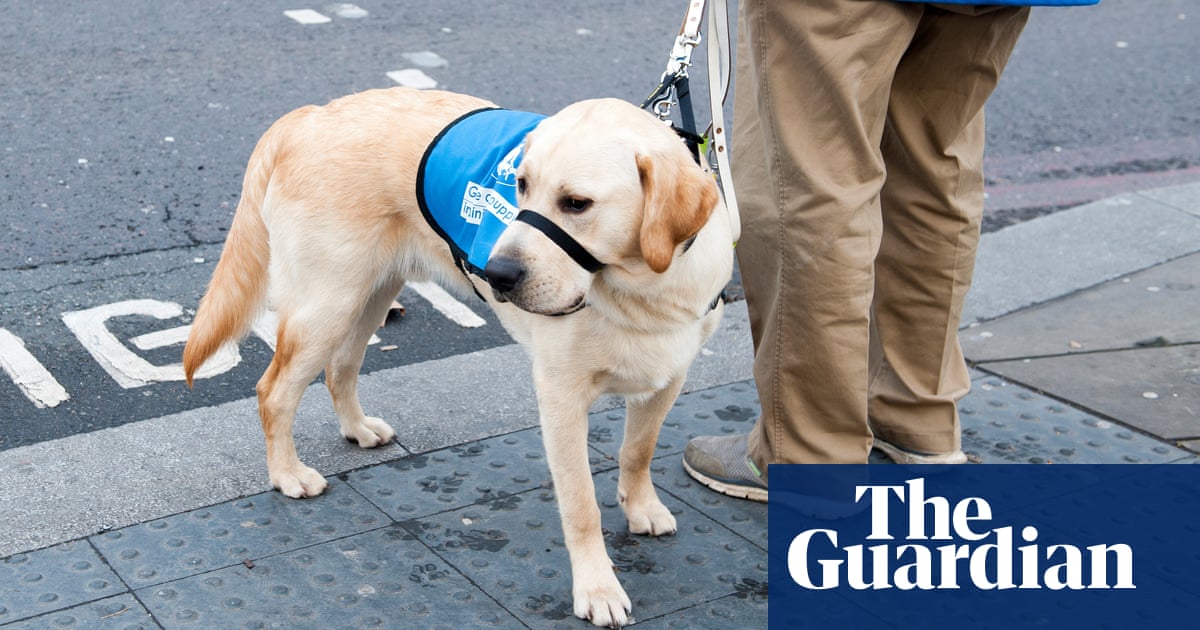Guide Dogs UK blames cost of living crisis as it plans 160 redundancies

Guide Dogs UK, the largest trainer of dogs in the country, is to make about 160 people redundant – around 9% of its workforce – to prevent an estimated £20m funding gap opening up by 2026.
The charity blamed Covid and the cost of living crisis: veterinary bills have increased by almost 20% and pet food bills by 12% since 2023, with further increases expected.
“Our fixed costs have increased considerably over the past few years and our fundraising income has plateaued due to the external economic challenges,” said Andrew Lennox, CEO of the 90-year-old charity.
Workers in England, Scotland and Wales will go through a 60-day consultation period overseen by staff representatives, with those in Northern Ireland having a 90-day process.
No decisions will be made on where jobs are cut until after the consultations but a spokesperson said the charity’s frontline services will not be “touched, reduced or limited”.
“Reducing the wait for a guide dog will continue to be an organisational priority, along with increasing the number of partnerships we produce,” said Lennox.
“But demand for our services is only set to increase, with the number of people with sight loss in the UK predicted to double to more than 4 million by 2050. It is therefore more important than ever that Guide Dogs is structured to support even more people with sight loss to live the life they choose.
“Our change programme will enable us to increase our income, make cost savings and ensure we’re structured to be able to support and deliver exceptional outcomes for those living with sight loss for the next 90 years and beyond,” Lennox added.
The charity is also closing its My Sighted Guide service by the end of the year. The service, which provided “sighted guiding” to those who wanted to go out , has been hit by a fall in volunteer numbers since Covid.
Instead, the charity will refocus its resources on training people in public life – in libraries, on public transport, in local shops – to provide sighted guiding support.
“We want to make awareness of sighted guidance as widely available as first aid,” said a spokesperson for the charity.
Charities nationwide have been fighting increased costs and reduced donations. Crisis, the homelessness charity, paid more than £2m in redundancy costs last year, while Macmillan Cancer Support, one of Britain’s biggest and best-known charities, is planning to axe 150 jobs – one in 14 of its workforce.
Analysis of the 2023 spring budget found funding had not flowed down to frontline charity services, in effect creating a £1bn cut in real terms and creating the risk of widespread charity closures.
Sarah Vibert, the chief executive of the National Council for Voluntary Organisations, said: “Charities of all sizes are facing a triple threat of record demand, falling income and rising operational costs – with none of these showing signs of letting up anytime soon.”
Related
Llyods Recruiting Engineers In India After Slashing Jobs In UK
Lloyds Banking Group is planning to hire hundreds of engineers in India as the company plans to shift its employment opportunit
Major new funding for music acts that supercharged careers of…
£1.6m Music Export Growth Scheme to support 58 independent UK artists to tour the world Funding will boost UK’s creative industries – a key growth se
Well-loved restaurant chain to close 8 venues across UK as…
A BELOVED restaurant chain has announced it will close eight venues across the UK, scrapping 158 jobs in the process.Owners are pointing the finger at Labour's
US adds 151,000 jobs in February as unemployment rate ticks…
The latest figures published by the US Bureau of Labor Statistics today (7 March) came in below market expectations, with economists polled by












